LAW220: Corporation Act Analysis - Directors' Duties
VerifiedAdded on 2022/10/19
|11
|2222
|270
Homework Assignment
AI Summary
This assignment analyzes the duties of directors under the Australian Corporation Act, addressing issues of liability and breaches of duty. It examines fiduciary duties, statutory duties outlined in the Act (including sections 180-184), and the application of these duties to specific case scenarios. The document employs the ILAC method (Issue, Law, Application, Conclusion) to assess the responsibilities of directors, including diligence, good faith, proper use of power, and avoidance of conflicts of interest. The analysis includes relevant case studies and discusses potential defenses for directors facing claims of misconduct, making it a valuable resource for law students studying corporate governance and company law. The assignment covers scenarios involving insurance policies, personal loans, misuse of company assets, and insider trading, providing a comprehensive overview of director's obligations and potential liabilities.
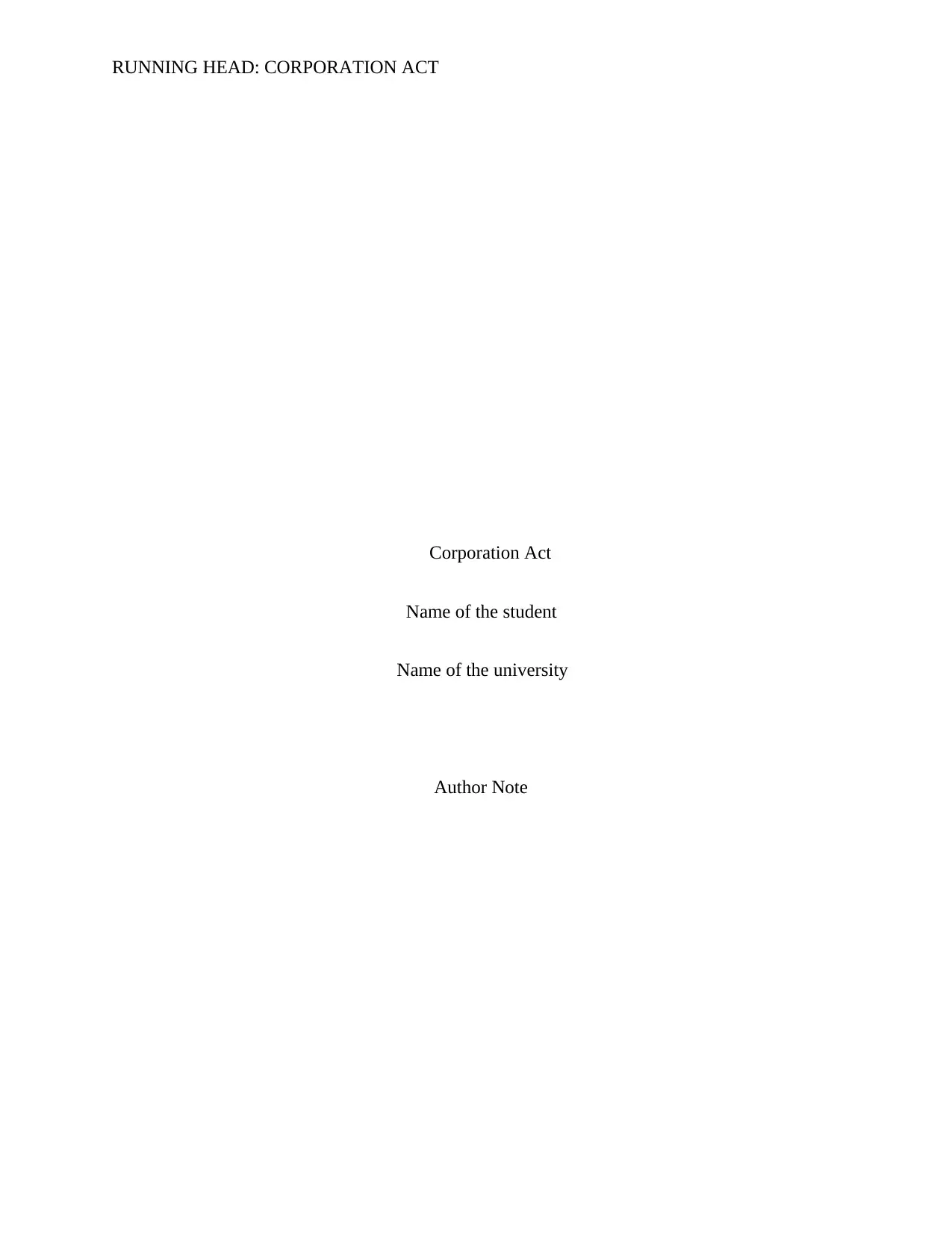
RUNNING HEAD: CORPORATION ACT
Corporation Act
Name of the student
Name of the university
Author Note
Corporation Act
Name of the student
Name of the university
Author Note
Paraphrase This Document
Need a fresh take? Get an instant paraphrase of this document with our AI Paraphraser
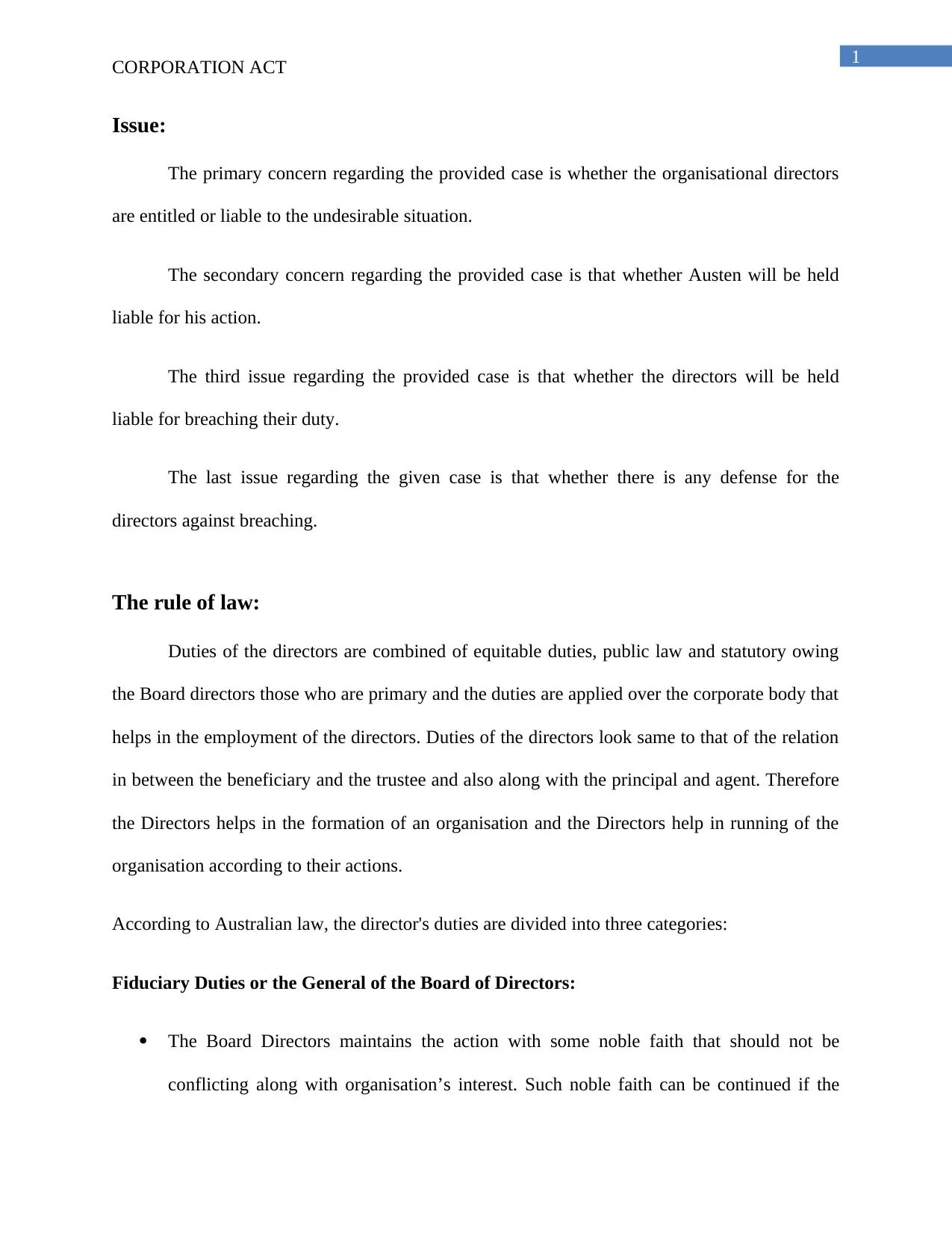
1
CORPORATION ACT
Issue:
The primary concern regarding the provided case is whether the organisational directors
are entitled or liable to the undesirable situation.
The secondary concern regarding the provided case is that whether Austen will be held
liable for his action.
The third issue regarding the provided case is that whether the directors will be held
liable for breaching their duty.
The last issue regarding the given case is that whether there is any defense for the
directors against breaching.
The rule of law:
Duties of the directors are combined of equitable duties, public law and statutory owing
the Board directors those who are primary and the duties are applied over the corporate body that
helps in the employment of the directors. Duties of the directors look same to that of the relation
in between the beneficiary and the trustee and also along with the principal and agent. Therefore
the Directors helps in the formation of an organisation and the Directors help in running of the
organisation according to their actions.
According to Australian law, the director's duties are divided into three categories:
Fiduciary Duties or the General of the Board of Directors:
The Board Directors maintains the action with some noble faith that should not be
conflicting along with organisation’s interest. Such noble faith can be continued if the
CORPORATION ACT
Issue:
The primary concern regarding the provided case is whether the organisational directors
are entitled or liable to the undesirable situation.
The secondary concern regarding the provided case is that whether Austen will be held
liable for his action.
The third issue regarding the provided case is that whether the directors will be held
liable for breaching their duty.
The last issue regarding the given case is that whether there is any defense for the
directors against breaching.
The rule of law:
Duties of the directors are combined of equitable duties, public law and statutory owing
the Board directors those who are primary and the duties are applied over the corporate body that
helps in the employment of the directors. Duties of the directors look same to that of the relation
in between the beneficiary and the trustee and also along with the principal and agent. Therefore
the Directors helps in the formation of an organisation and the Directors help in running of the
organisation according to their actions.
According to Australian law, the director's duties are divided into three categories:
Fiduciary Duties or the General of the Board of Directors:
The Board Directors maintains the action with some noble faith that should not be
conflicting along with organisation’s interest. Such noble faith can be continued if the
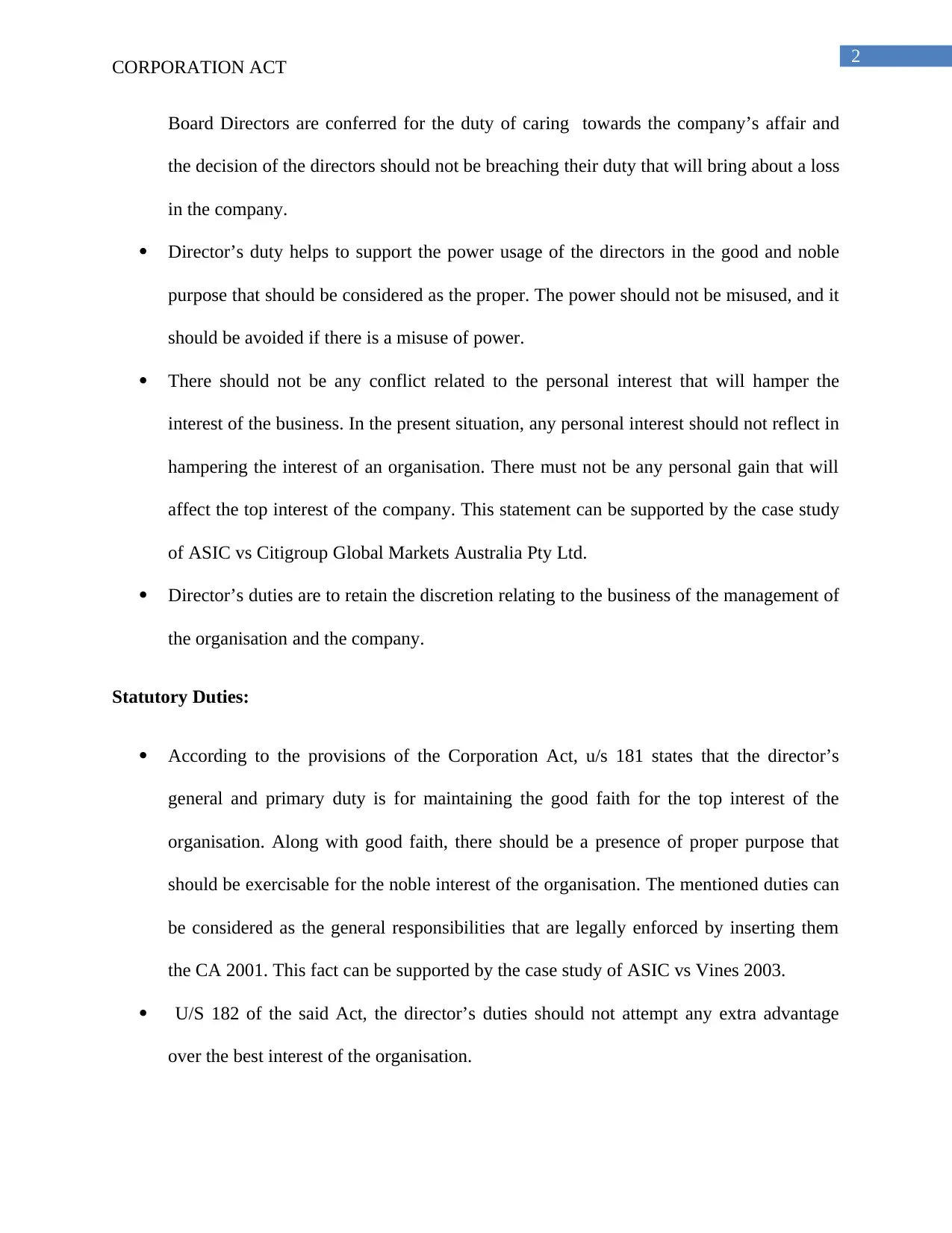
2
CORPORATION ACT
Board Directors are conferred for the duty of caring towards the company’s affair and
the decision of the directors should not be breaching their duty that will bring about a loss
in the company.
Director’s duty helps to support the power usage of the directors in the good and noble
purpose that should be considered as the proper. The power should not be misused, and it
should be avoided if there is a misuse of power.
There should not be any conflict related to the personal interest that will hamper the
interest of the business. In the present situation, any personal interest should not reflect in
hampering the interest of an organisation. There must not be any personal gain that will
affect the top interest of the company. This statement can be supported by the case study
of ASIC vs Citigroup Global Markets Australia Pty Ltd.
Director’s duties are to retain the discretion relating to the business of the management of
the organisation and the company.
Statutory Duties:
According to the provisions of the Corporation Act, u/s 181 states that the director’s
general and primary duty is for maintaining the good faith for the top interest of the
organisation. Along with good faith, there should be a presence of proper purpose that
should be exercisable for the noble interest of the organisation. The mentioned duties can
be considered as the general responsibilities that are legally enforced by inserting them
the CA 2001. This fact can be supported by the case study of ASIC vs Vines 2003.
U/S 182 of the said Act, the director’s duties should not attempt any extra advantage
over the best interest of the organisation.
CORPORATION ACT
Board Directors are conferred for the duty of caring towards the company’s affair and
the decision of the directors should not be breaching their duty that will bring about a loss
in the company.
Director’s duty helps to support the power usage of the directors in the good and noble
purpose that should be considered as the proper. The power should not be misused, and it
should be avoided if there is a misuse of power.
There should not be any conflict related to the personal interest that will hamper the
interest of the business. In the present situation, any personal interest should not reflect in
hampering the interest of an organisation. There must not be any personal gain that will
affect the top interest of the company. This statement can be supported by the case study
of ASIC vs Citigroup Global Markets Australia Pty Ltd.
Director’s duties are to retain the discretion relating to the business of the management of
the organisation and the company.
Statutory Duties:
According to the provisions of the Corporation Act, u/s 181 states that the director’s
general and primary duty is for maintaining the good faith for the top interest of the
organisation. Along with good faith, there should be a presence of proper purpose that
should be exercisable for the noble interest of the organisation. The mentioned duties can
be considered as the general responsibilities that are legally enforced by inserting them
the CA 2001. This fact can be supported by the case study of ASIC vs Vines 2003.
U/S 182 of the said Act, the director’s duties should not attempt any extra advantage
over the best interest of the organisation.
⊘ This is a preview!⊘
Do you want full access?
Subscribe today to unlock all pages.

Trusted by 1+ million students worldwide
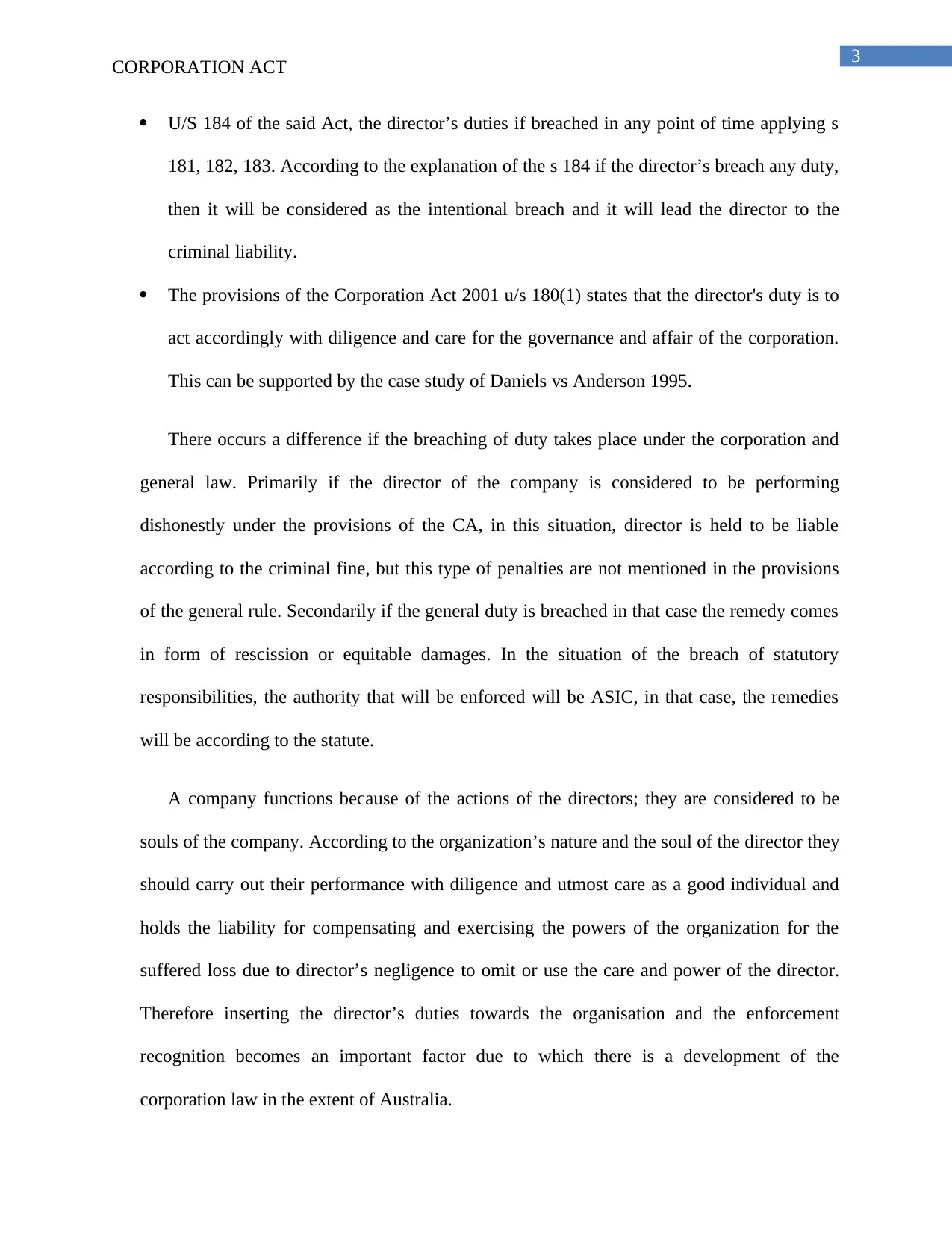
3
CORPORATION ACT
U/S 184 of the said Act, the director’s duties if breached in any point of time applying s
181, 182, 183. According to the explanation of the s 184 if the director’s breach any duty,
then it will be considered as the intentional breach and it will lead the director to the
criminal liability.
The provisions of the Corporation Act 2001 u/s 180(1) states that the director's duty is to
act accordingly with diligence and care for the governance and affair of the corporation.
This can be supported by the case study of Daniels vs Anderson 1995.
There occurs a difference if the breaching of duty takes place under the corporation and
general law. Primarily if the director of the company is considered to be performing
dishonestly under the provisions of the CA, in this situation, director is held to be liable
according to the criminal fine, but this type of penalties are not mentioned in the provisions
of the general rule. Secondarily if the general duty is breached in that case the remedy comes
in form of rescission or equitable damages. In the situation of the breach of statutory
responsibilities, the authority that will be enforced will be ASIC, in that case, the remedies
will be according to the statute.
A company functions because of the actions of the directors; they are considered to be
souls of the company. According to the organization’s nature and the soul of the director they
should carry out their performance with diligence and utmost care as a good individual and
holds the liability for compensating and exercising the powers of the organization for the
suffered loss due to director’s negligence to omit or use the care and power of the director.
Therefore inserting the director’s duties towards the organisation and the enforcement
recognition becomes an important factor due to which there is a development of the
corporation law in the extent of Australia.
CORPORATION ACT
U/S 184 of the said Act, the director’s duties if breached in any point of time applying s
181, 182, 183. According to the explanation of the s 184 if the director’s breach any duty,
then it will be considered as the intentional breach and it will lead the director to the
criminal liability.
The provisions of the Corporation Act 2001 u/s 180(1) states that the director's duty is to
act accordingly with diligence and care for the governance and affair of the corporation.
This can be supported by the case study of Daniels vs Anderson 1995.
There occurs a difference if the breaching of duty takes place under the corporation and
general law. Primarily if the director of the company is considered to be performing
dishonestly under the provisions of the CA, in this situation, director is held to be liable
according to the criminal fine, but this type of penalties are not mentioned in the provisions
of the general rule. Secondarily if the general duty is breached in that case the remedy comes
in form of rescission or equitable damages. In the situation of the breach of statutory
responsibilities, the authority that will be enforced will be ASIC, in that case, the remedies
will be according to the statute.
A company functions because of the actions of the directors; they are considered to be
souls of the company. According to the organization’s nature and the soul of the director they
should carry out their performance with diligence and utmost care as a good individual and
holds the liability for compensating and exercising the powers of the organization for the
suffered loss due to director’s negligence to omit or use the care and power of the director.
Therefore inserting the director’s duties towards the organisation and the enforcement
recognition becomes an important factor due to which there is a development of the
corporation law in the extent of Australia.
Paraphrase This Document
Need a fresh take? Get an instant paraphrase of this document with our AI Paraphraser
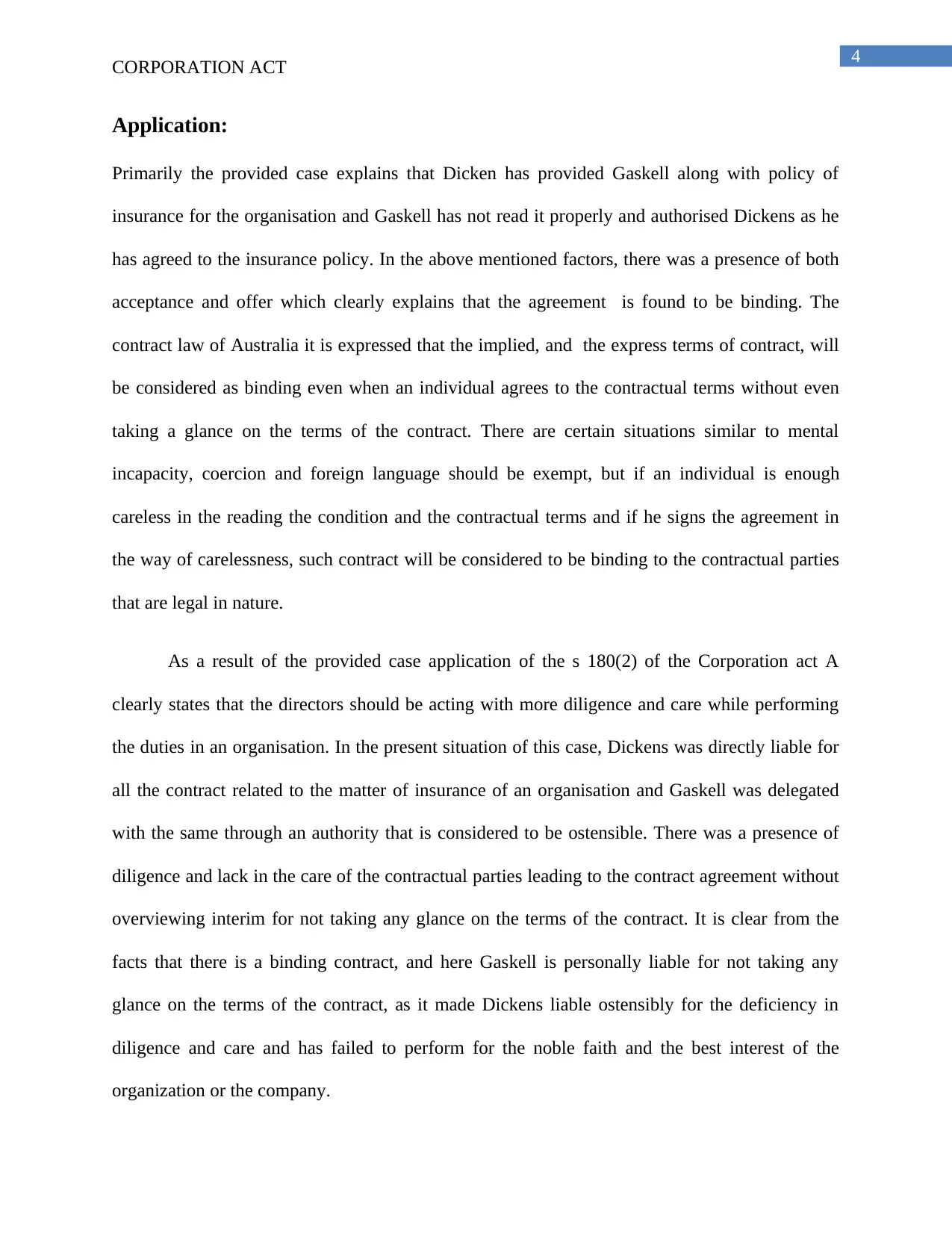
4
CORPORATION ACT
Application:
Primarily the provided case explains that Dicken has provided Gaskell along with policy of
insurance for the organisation and Gaskell has not read it properly and authorised Dickens as he
has agreed to the insurance policy. In the above mentioned factors, there was a presence of both
acceptance and offer which clearly explains that the agreement is found to be binding. The
contract law of Australia it is expressed that the implied, and the express terms of contract, will
be considered as binding even when an individual agrees to the contractual terms without even
taking a glance on the terms of the contract. There are certain situations similar to mental
incapacity, coercion and foreign language should be exempt, but if an individual is enough
careless in the reading the condition and the contractual terms and if he signs the agreement in
the way of carelessness, such contract will be considered to be binding to the contractual parties
that are legal in nature.
As a result of the provided case application of the s 180(2) of the Corporation act A
clearly states that the directors should be acting with more diligence and care while performing
the duties in an organisation. In the present situation of this case, Dickens was directly liable for
all the contract related to the matter of insurance of an organisation and Gaskell was delegated
with the same through an authority that is considered to be ostensible. There was a presence of
diligence and lack in the care of the contractual parties leading to the contract agreement without
overviewing interim for not taking any glance on the terms of the contract. It is clear from the
facts that there is a binding contract, and here Gaskell is personally liable for not taking any
glance on the terms of the contract, as it made Dickens liable ostensibly for the deficiency in
diligence and care and has failed to perform for the noble faith and the best interest of the
organization or the company.
CORPORATION ACT
Application:
Primarily the provided case explains that Dicken has provided Gaskell along with policy of
insurance for the organisation and Gaskell has not read it properly and authorised Dickens as he
has agreed to the insurance policy. In the above mentioned factors, there was a presence of both
acceptance and offer which clearly explains that the agreement is found to be binding. The
contract law of Australia it is expressed that the implied, and the express terms of contract, will
be considered as binding even when an individual agrees to the contractual terms without even
taking a glance on the terms of the contract. There are certain situations similar to mental
incapacity, coercion and foreign language should be exempt, but if an individual is enough
careless in the reading the condition and the contractual terms and if he signs the agreement in
the way of carelessness, such contract will be considered to be binding to the contractual parties
that are legal in nature.
As a result of the provided case application of the s 180(2) of the Corporation act A
clearly states that the directors should be acting with more diligence and care while performing
the duties in an organisation. In the present situation of this case, Dickens was directly liable for
all the contract related to the matter of insurance of an organisation and Gaskell was delegated
with the same through an authority that is considered to be ostensible. There was a presence of
diligence and lack in the care of the contractual parties leading to the contract agreement without
overviewing interim for not taking any glance on the terms of the contract. It is clear from the
facts that there is a binding contract, and here Gaskell is personally liable for not taking any
glance on the terms of the contract, as it made Dickens liable ostensibly for the deficiency in
diligence and care and has failed to perform for the noble faith and the best interest of the
organization or the company.
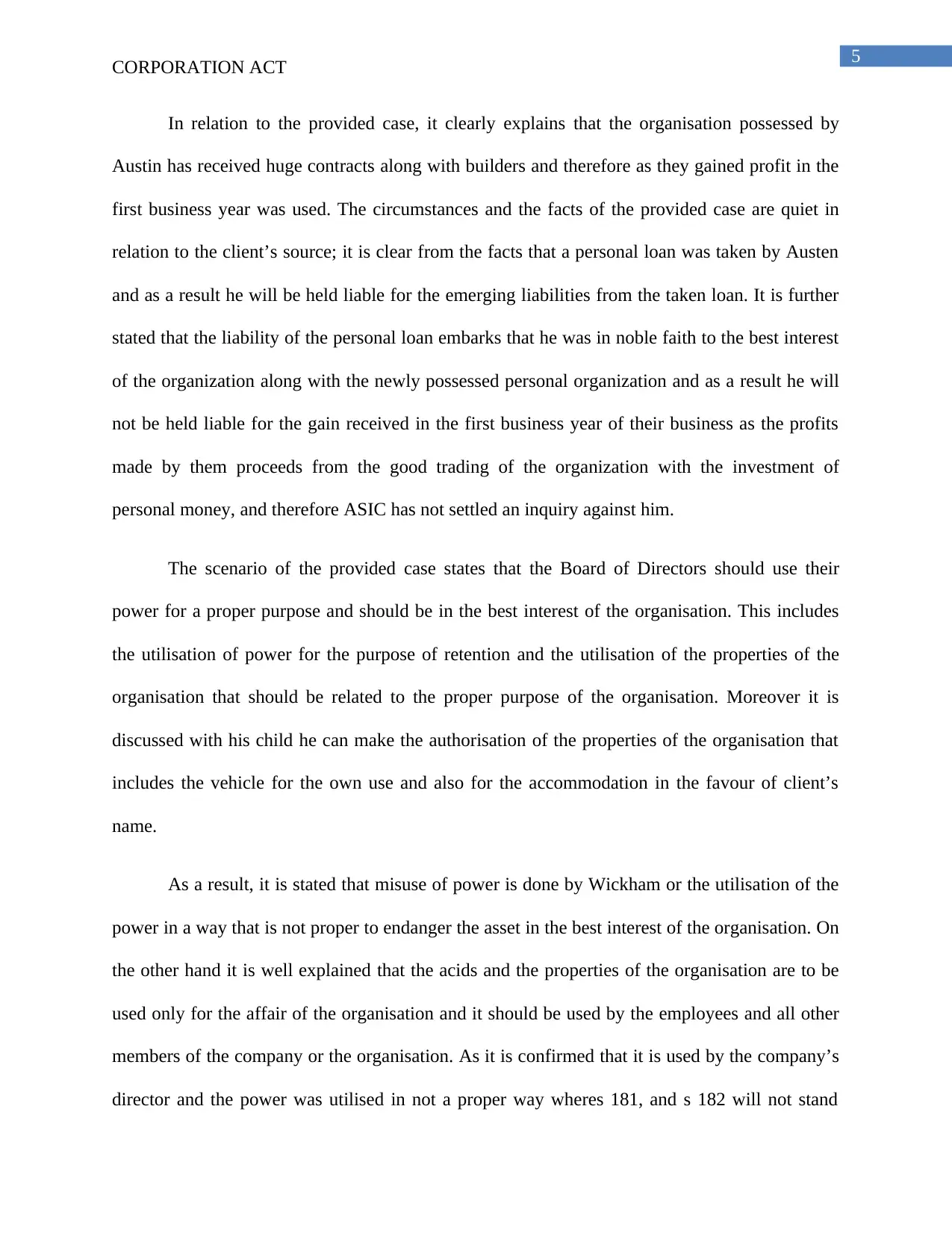
5
CORPORATION ACT
In relation to the provided case, it clearly explains that the organisation possessed by
Austin has received huge contracts along with builders and therefore as they gained profit in the
first business year was used. The circumstances and the facts of the provided case are quiet in
relation to the client’s source; it is clear from the facts that a personal loan was taken by Austen
and as a result he will be held liable for the emerging liabilities from the taken loan. It is further
stated that the liability of the personal loan embarks that he was in noble faith to the best interest
of the organization along with the newly possessed personal organization and as a result he will
not be held liable for the gain received in the first business year of their business as the profits
made by them proceeds from the good trading of the organization with the investment of
personal money, and therefore ASIC has not settled an inquiry against him.
The scenario of the provided case states that the Board of Directors should use their
power for a proper purpose and should be in the best interest of the organisation. This includes
the utilisation of power for the purpose of retention and the utilisation of the properties of the
organisation that should be related to the proper purpose of the organisation. Moreover it is
discussed with his child he can make the authorisation of the properties of the organisation that
includes the vehicle for the own use and also for the accommodation in the favour of client’s
name.
As a result, it is stated that misuse of power is done by Wickham or the utilisation of the
power in a way that is not proper to endanger the asset in the best interest of the organisation. On
the other hand it is well explained that the acids and the properties of the organisation are to be
used only for the affair of the organisation and it should be used by the employees and all other
members of the company or the organisation. As it is confirmed that it is used by the company’s
director and the power was utilised in not a proper way wheres 181, and s 182 will not stand
CORPORATION ACT
In relation to the provided case, it clearly explains that the organisation possessed by
Austin has received huge contracts along with builders and therefore as they gained profit in the
first business year was used. The circumstances and the facts of the provided case are quiet in
relation to the client’s source; it is clear from the facts that a personal loan was taken by Austen
and as a result he will be held liable for the emerging liabilities from the taken loan. It is further
stated that the liability of the personal loan embarks that he was in noble faith to the best interest
of the organization along with the newly possessed personal organization and as a result he will
not be held liable for the gain received in the first business year of their business as the profits
made by them proceeds from the good trading of the organization with the investment of
personal money, and therefore ASIC has not settled an inquiry against him.
The scenario of the provided case states that the Board of Directors should use their
power for a proper purpose and should be in the best interest of the organisation. This includes
the utilisation of power for the purpose of retention and the utilisation of the properties of the
organisation that should be related to the proper purpose of the organisation. Moreover it is
discussed with his child he can make the authorisation of the properties of the organisation that
includes the vehicle for the own use and also for the accommodation in the favour of client’s
name.
As a result, it is stated that misuse of power is done by Wickham or the utilisation of the
power in a way that is not proper to endanger the asset in the best interest of the organisation. On
the other hand it is well explained that the acids and the properties of the organisation are to be
used only for the affair of the organisation and it should be used by the employees and all other
members of the company or the organisation. As it is confirmed that it is used by the company’s
director and the power was utilised in not a proper way wheres 181, and s 182 will not stand
⊘ This is a preview!⊘
Do you want full access?
Subscribe today to unlock all pages.

Trusted by 1+ million students worldwide
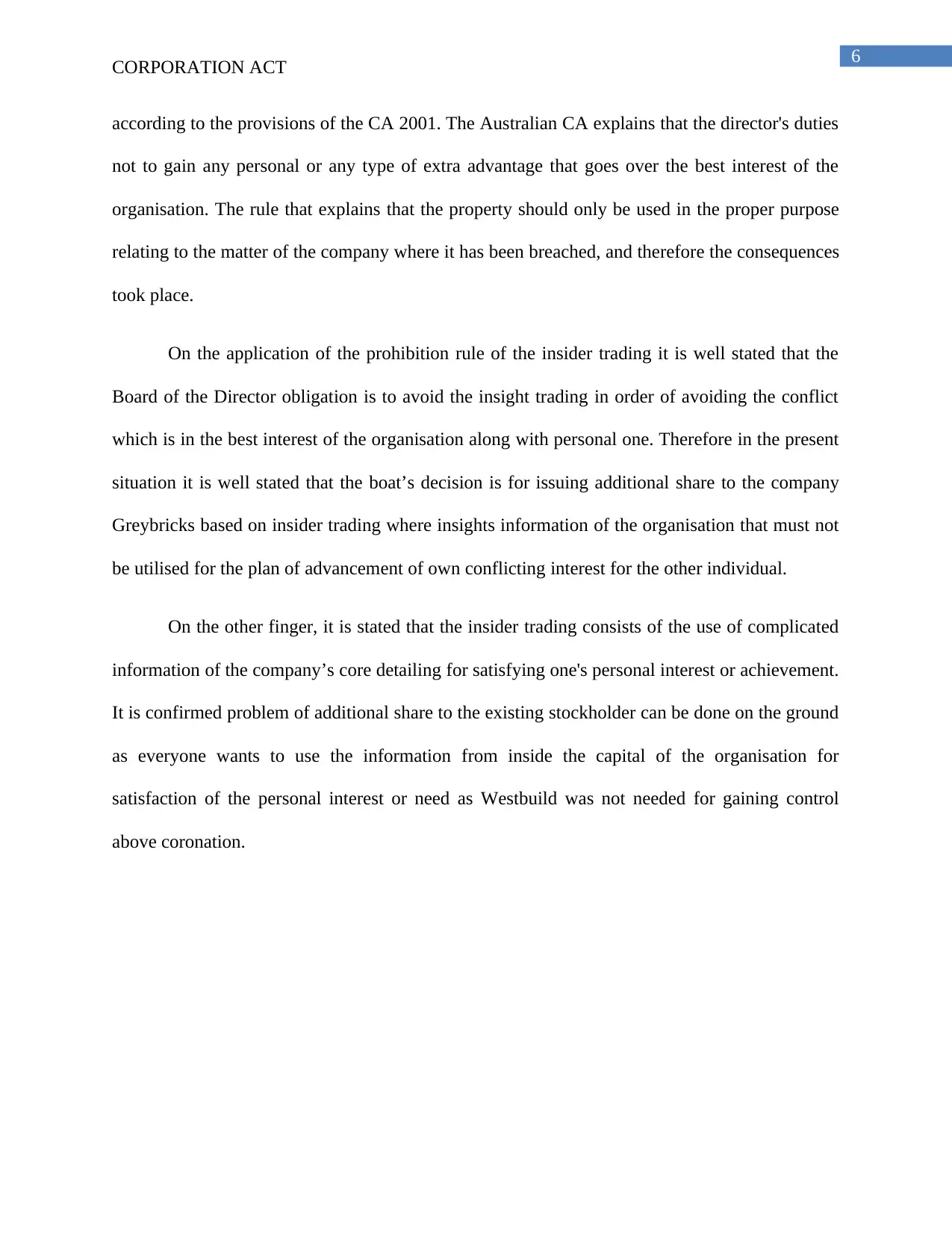
6
CORPORATION ACT
according to the provisions of the CA 2001. The Australian CA explains that the director's duties
not to gain any personal or any type of extra advantage that goes over the best interest of the
organisation. The rule that explains that the property should only be used in the proper purpose
relating to the matter of the company where it has been breached, and therefore the consequences
took place.
On the application of the prohibition rule of the insider trading it is well stated that the
Board of the Director obligation is to avoid the insight trading in order of avoiding the conflict
which is in the best interest of the organisation along with personal one. Therefore in the present
situation it is well stated that the boat’s decision is for issuing additional share to the company
Greybricks based on insider trading where insights information of the organisation that must not
be utilised for the plan of advancement of own conflicting interest for the other individual.
On the other finger, it is stated that the insider trading consists of the use of complicated
information of the company’s core detailing for satisfying one's personal interest or achievement.
It is confirmed problem of additional share to the existing stockholder can be done on the ground
as everyone wants to use the information from inside the capital of the organisation for
satisfaction of the personal interest or need as Westbuild was not needed for gaining control
above coronation.
CORPORATION ACT
according to the provisions of the CA 2001. The Australian CA explains that the director's duties
not to gain any personal or any type of extra advantage that goes over the best interest of the
organisation. The rule that explains that the property should only be used in the proper purpose
relating to the matter of the company where it has been breached, and therefore the consequences
took place.
On the application of the prohibition rule of the insider trading it is well stated that the
Board of the Director obligation is to avoid the insight trading in order of avoiding the conflict
which is in the best interest of the organisation along with personal one. Therefore in the present
situation it is well stated that the boat’s decision is for issuing additional share to the company
Greybricks based on insider trading where insights information of the organisation that must not
be utilised for the plan of advancement of own conflicting interest for the other individual.
On the other finger, it is stated that the insider trading consists of the use of complicated
information of the company’s core detailing for satisfying one's personal interest or achievement.
It is confirmed problem of additional share to the existing stockholder can be done on the ground
as everyone wants to use the information from inside the capital of the organisation for
satisfaction of the personal interest or need as Westbuild was not needed for gaining control
above coronation.
Paraphrase This Document
Need a fresh take? Get an instant paraphrase of this document with our AI Paraphraser
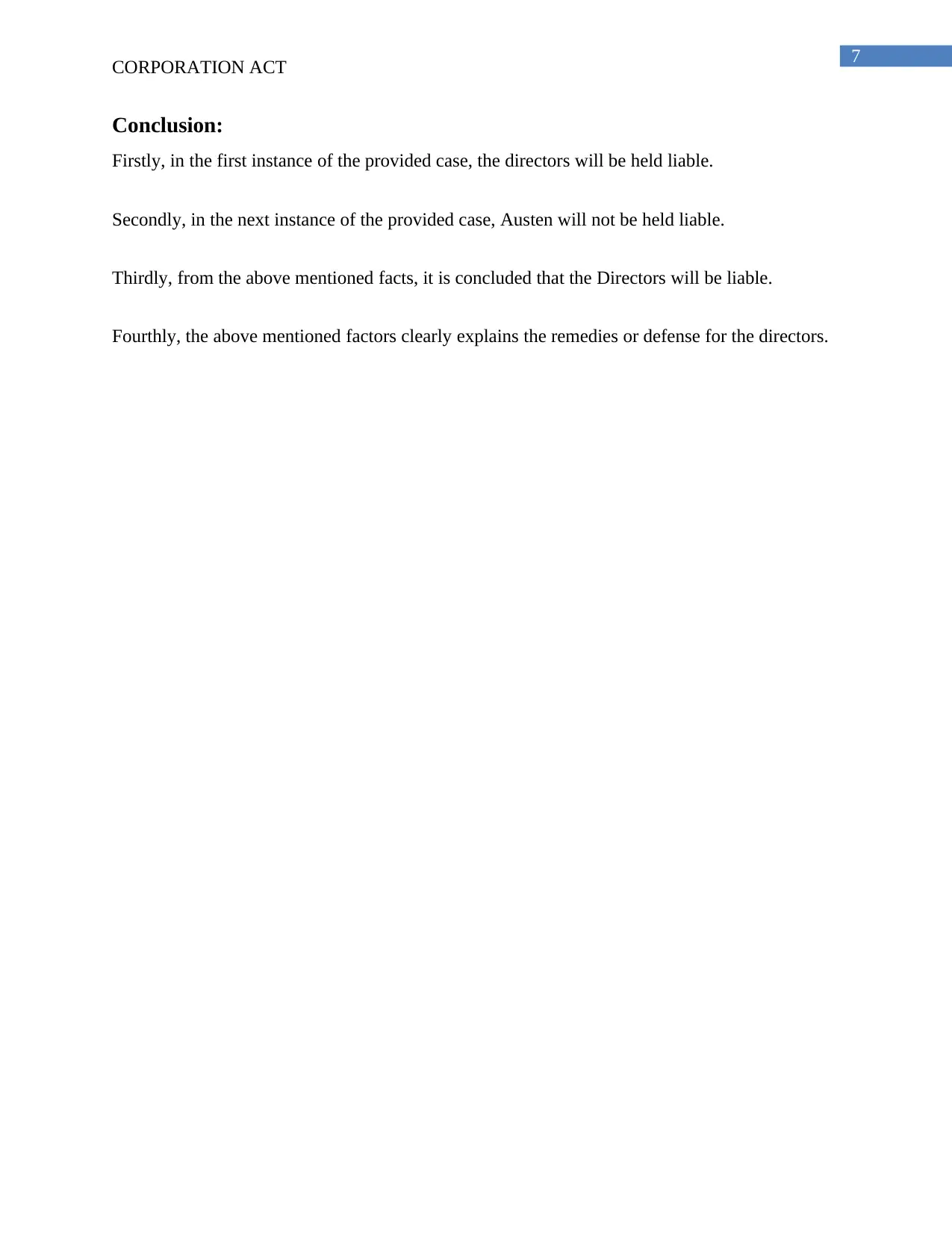
7
CORPORATION ACT
Conclusion:
Firstly, in the first instance of the provided case, the directors will be held liable.
Secondly, in the next instance of the provided case, Austen will not be held liable.
Thirdly, from the above mentioned facts, it is concluded that the Directors will be liable.
Fourthly, the above mentioned factors clearly explains the remedies or defense for the directors.
CORPORATION ACT
Conclusion:
Firstly, in the first instance of the provided case, the directors will be held liable.
Secondly, in the next instance of the provided case, Austen will not be held liable.
Thirdly, from the above mentioned facts, it is concluded that the Directors will be liable.
Fourthly, the above mentioned factors clearly explains the remedies or defense for the directors.
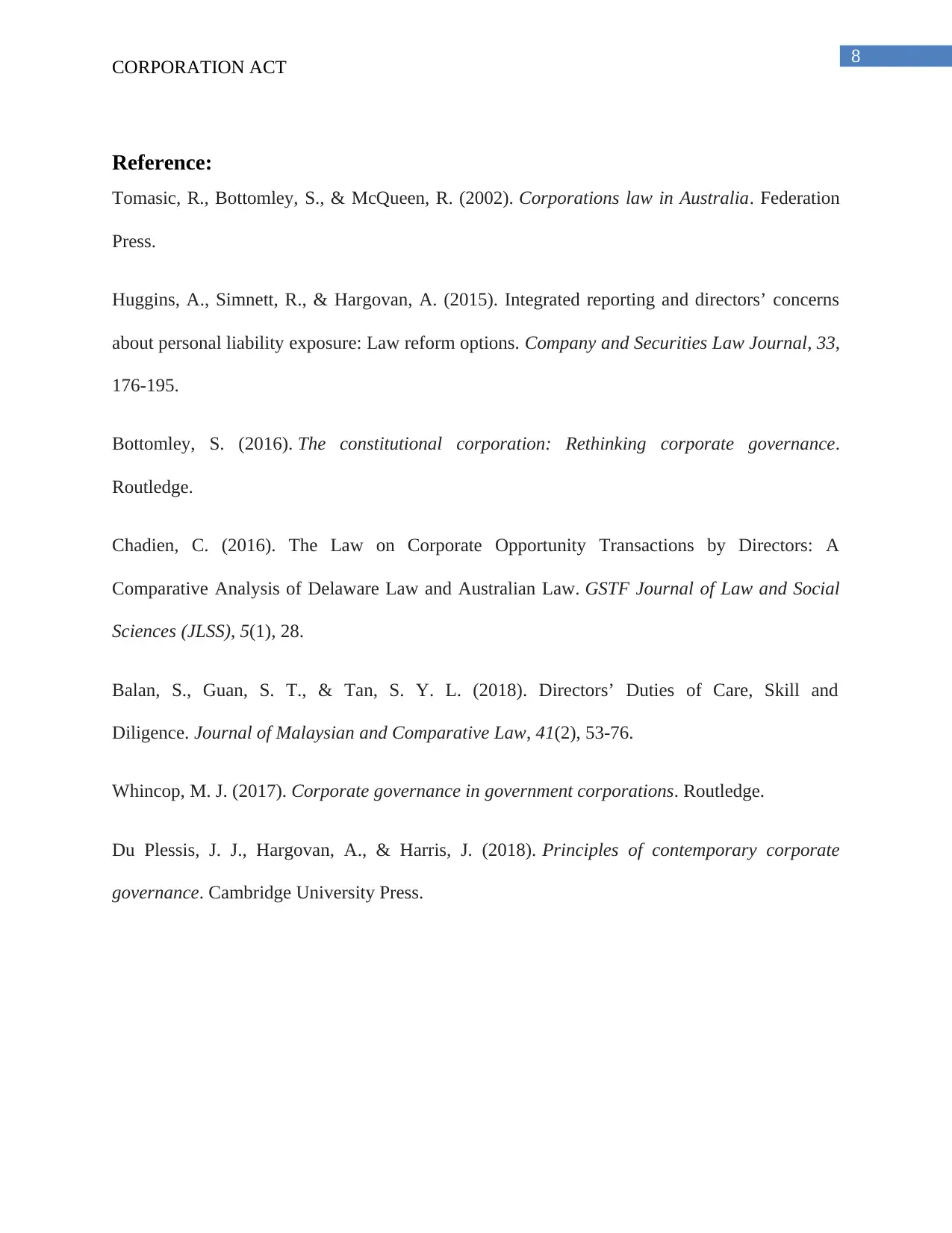
8
CORPORATION ACT
Reference:
Tomasic, R., Bottomley, S., & McQueen, R. (2002). Corporations law in Australia. Federation
Press.
Huggins, A., Simnett, R., & Hargovan, A. (2015). Integrated reporting and directors’ concerns
about personal liability exposure: Law reform options. Company and Securities Law Journal, 33,
176-195.
Bottomley, S. (2016). The constitutional corporation: Rethinking corporate governance.
Routledge.
Chadien, C. (2016). The Law on Corporate Opportunity Transactions by Directors: A
Comparative Analysis of Delaware Law and Australian Law. GSTF Journal of Law and Social
Sciences (JLSS), 5(1), 28.
Balan, S., Guan, S. T., & Tan, S. Y. L. (2018). Directors’ Duties of Care, Skill and
Diligence. Journal of Malaysian and Comparative Law, 41(2), 53-76.
Whincop, M. J. (2017). Corporate governance in government corporations. Routledge.
Du Plessis, J. J., Hargovan, A., & Harris, J. (2018). Principles of contemporary corporate
governance. Cambridge University Press.
CORPORATION ACT
Reference:
Tomasic, R., Bottomley, S., & McQueen, R. (2002). Corporations law in Australia. Federation
Press.
Huggins, A., Simnett, R., & Hargovan, A. (2015). Integrated reporting and directors’ concerns
about personal liability exposure: Law reform options. Company and Securities Law Journal, 33,
176-195.
Bottomley, S. (2016). The constitutional corporation: Rethinking corporate governance.
Routledge.
Chadien, C. (2016). The Law on Corporate Opportunity Transactions by Directors: A
Comparative Analysis of Delaware Law and Australian Law. GSTF Journal of Law and Social
Sciences (JLSS), 5(1), 28.
Balan, S., Guan, S. T., & Tan, S. Y. L. (2018). Directors’ Duties of Care, Skill and
Diligence. Journal of Malaysian and Comparative Law, 41(2), 53-76.
Whincop, M. J. (2017). Corporate governance in government corporations. Routledge.
Du Plessis, J. J., Hargovan, A., & Harris, J. (2018). Principles of contemporary corporate
governance. Cambridge University Press.
⊘ This is a preview!⊘
Do you want full access?
Subscribe today to unlock all pages.

Trusted by 1+ million students worldwide
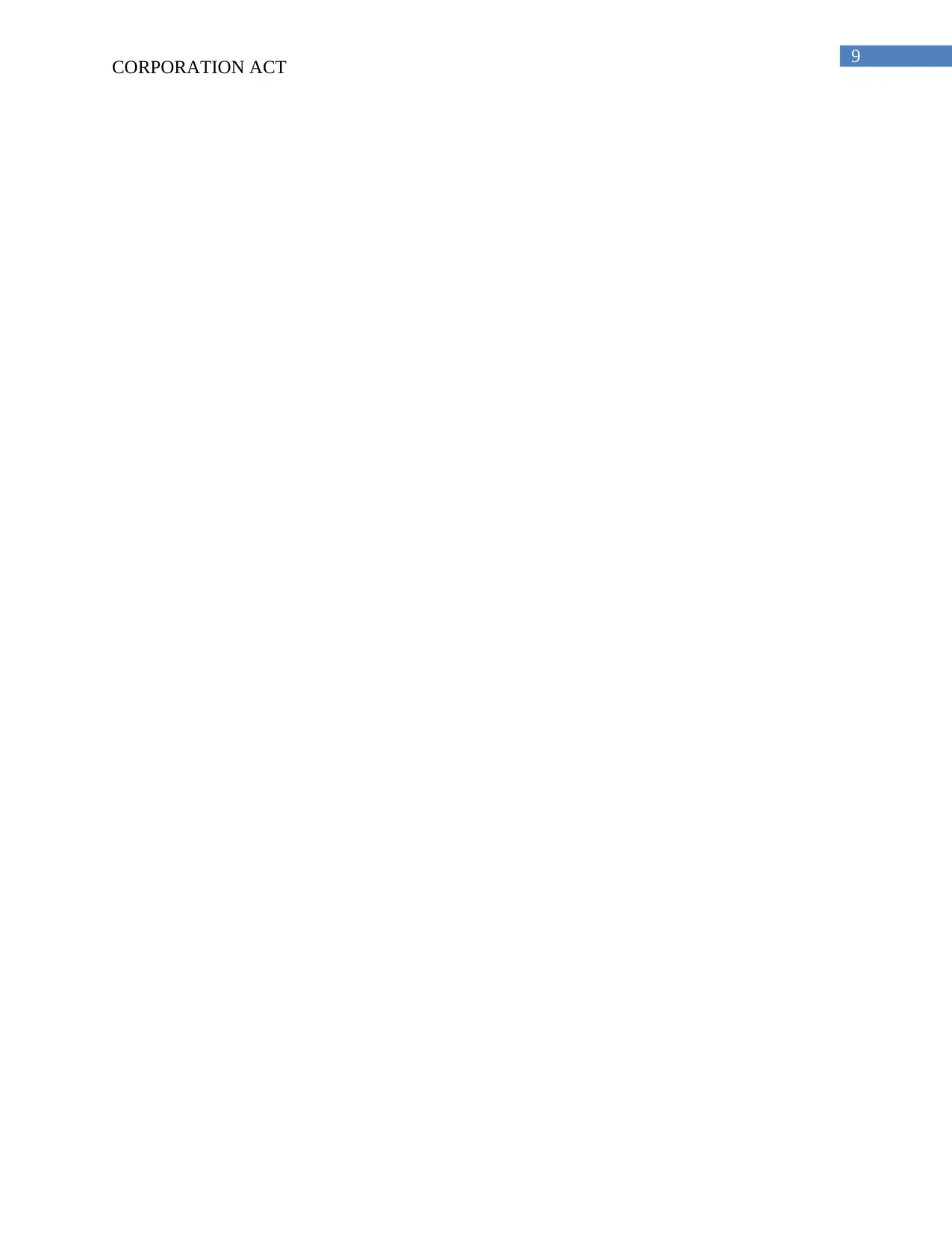
9
CORPORATION ACT
CORPORATION ACT
Paraphrase This Document
Need a fresh take? Get an instant paraphrase of this document with our AI Paraphraser
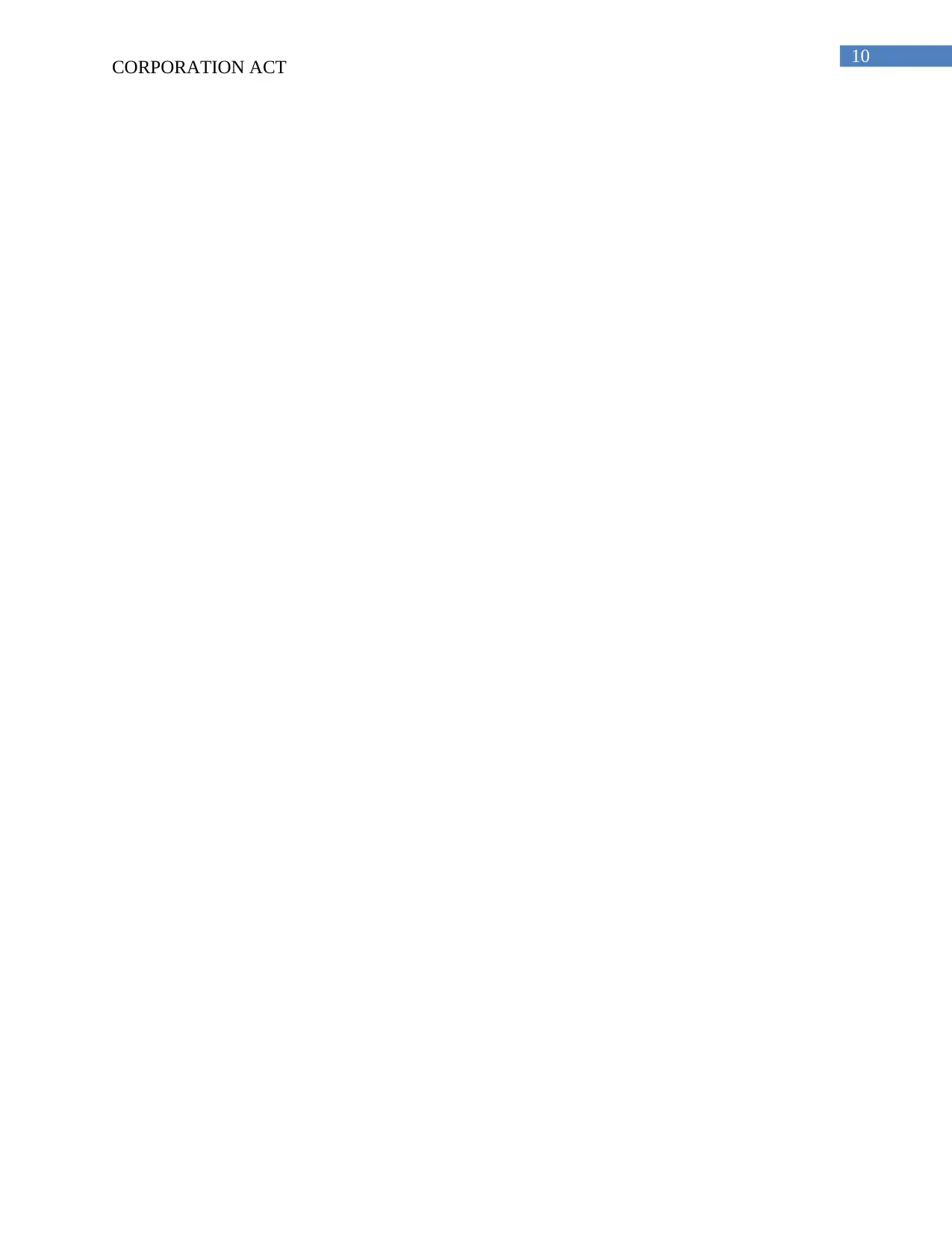
10
CORPORATION ACT
CORPORATION ACT
1 out of 11
Related Documents
Your All-in-One AI-Powered Toolkit for Academic Success.
+13062052269
info@desklib.com
Available 24*7 on WhatsApp / Email
![[object Object]](/_next/static/media/star-bottom.7253800d.svg)
Unlock your academic potential
Copyright © 2020–2026 A2Z Services. All Rights Reserved. Developed and managed by ZUCOL.




